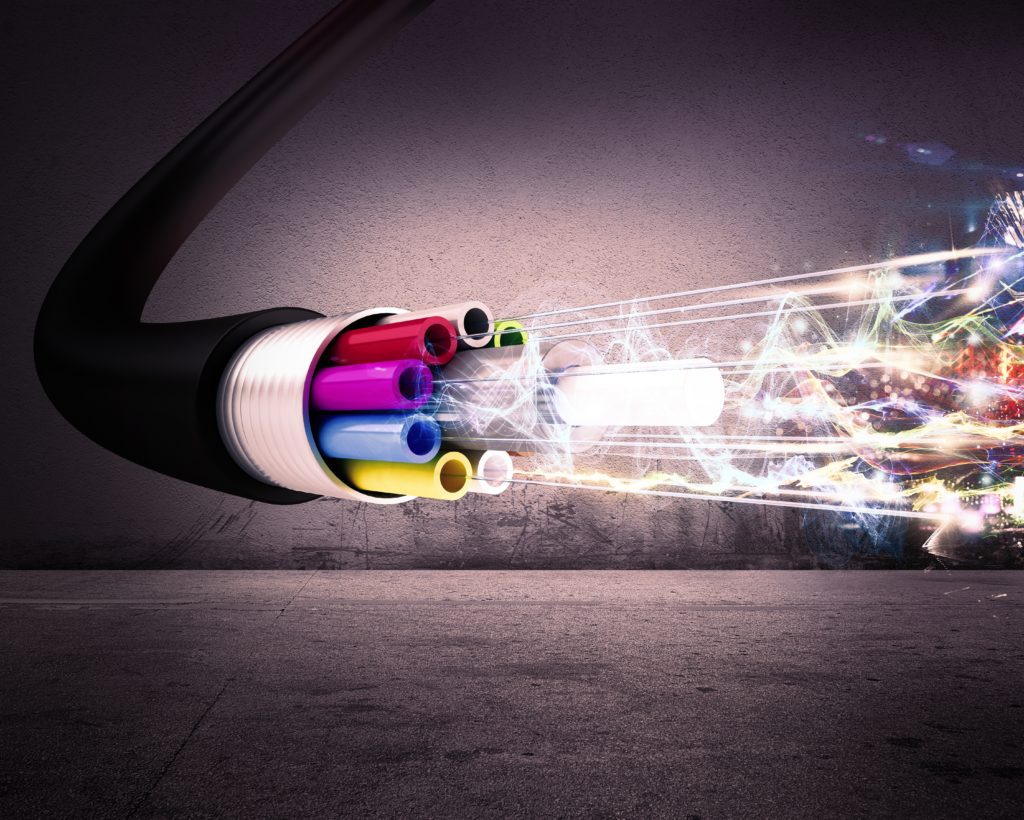The emergence of 5G, cloud, IoT, mobile computing, HD video and other high tech applications is driving a need for better connectivity and bandwidth in virtually every space, including workplaces and commercial office buildings. Fiber cabling is the primary technology capable of supporting these applications today and in the future.
The average internet speed has nearly quadrupled to 7.3 Mbps compared with 2.3 Mbps in 2011. At the same time global internet traffic, which has been doubling every two years, is set to grow even faster due to the increased uptake of mobile computing and smartphones.
5G, the next standard in mobile technology, is expected to deliver speeds in excess of 10 Gbps and transmit data up to 150 times faster than 4G, and support the increasing data transmission requirements from IoT devices, cloud services, virtual and augmented reality and blockchain technology. The provision of connectivity is becoming the most significant requirement of the century.
Key benefits of a fiber-based infrastructure
1. Higher bandwidth
Fiber’s very high bandwidth makes it possible to transport huge volumes of data. While fiber-optic internet for business is not truly unlimited, the bandwidth availability is significantly higher, and its speed does not decrease as high demands are put on the network. Businesses requiring SIP trunking, web conferencing, high definition streaming, file sharing, and cloud applications need higher bandwidth.
As more companies rely on these tools, it will be essential that building owners offer fiber-based internet connectivity in their properties.
2. Improves internet speed
The fiber-optic internet is many times faster than even the highest-speed copper internet connections and can range from 5 Mbps to 100 Gbps. During periods of high demand for internet access, the fiber-optic Internet is not likely to slow down. Slow internet connections cost employers one week per year of productivity, according to research by Sandisk.
While the time wasted may seem minor repeated slow internet connectivity can result in decrease tenant satisfaction and retention. If multiple tenants experience slow connectivity, they may be less likely to renew leases. Studies have shown that slow connectivity and workplaces deemed to be less technologically advanced lead to higher workplace dissatisfaction of employees and can negatively, impact employee retention.
3. Cybersecurity
Perhaps one of the most overlooked but essential benefits of fiber-based connectivity is that fiber cables are far less vulnerable to cyber attacks. A recent study found that 40% of CEOs globally were concerned about cybersecurity threats.
Fiber-based cables are much harder to tap into without being detected and are effective at keeping data secure during a cyber-hack. It is much harder to tap into fiber cables compared with copper because fiber cables leak light and the signal instantly disappears if tampered. In an age where information leaks have become the source of high profile news and companies are paying significant fines for losing their customer data, keeping information secure is becoming tantamount.
The ability to offer a more secure connectivity infrastructure is fast becoming a significant differentiating factor enabling building owners to attract tenants that are willing to pay a premium for security.
4. Lessens latency
Latency is a term used to describe delays that occur while processing data over an internet connection. Fiber-optic internet eliminates many of the latency issues users experience mainly when downloading or uploading video or high-definition content. Lowering your latency betters voice quality for VoIP users, the ability to move more apps to the cloud and enables faster downloads and uploads of huge files without disruption.
5. Increased cloud access
Today more than 82% of organizations are using the cloud in some capacity. Whether its customer relationship management (CRM) or data storage, the cloud has become a critical business tool. The speed and bandwidth capabilities of fiber internet mean faster access to information and applications stored in the cloud for occupants in the building.
6. Better signal strength
With broadband internet, the signal degrades as the user moves away from the switch. However, the signal strength of fiber-optic internet does not degrade as quickly over distance. Organizations in relatively large spaces can benefit from better signal strength throughout the facility. This is particularly true for employees in workspaces that are located a significant distance from the telecommunications room.
7. More durability than copper
Fiber optic cables are more durable and stronger than copper. Unlike copper, fiber-optic connectivity operates better than copper-based connectivity in inclement weather conditions that can result in damage or stall data transmission. Fiber cables are also immune to electromagnetic interference and are smaller, lighter in weight and easier to install compared with copper cables.
Unplanned downtime due to internet outages can halt business operations costing tenants valuable time and money and dramatically impact their lease renewal decisions.
